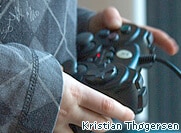Children who repeatedly play violent computer games act out in real life what they see on screen, a university study of more than 3,000 children has said.
Researchers at Iowa State University found that, over time, children start to think more aggressively and lose their sensitivity to violence.
The study also showed that when provoked at home or school children will react in a similar way to when they were playing the game.
Practice
The study analysed 3,000 boys and girls for three years, looking at how much time they spent playing computer games, the violence in those games and the changes in behaviour.
Although boys said they spent more time than girls playing such games, the effects on behaviour were the same.
Douglas Gentile, the lead author of the study said: “If you practice over and over, you have that knowledge in your head. The fact that you haven’t played the piano in years doesn’t mean you can’t still sit down and play something”.
Enemies
“It’s the same with violent games”, he added, “you practice being vigilant for enemies, practice thinking that it’s acceptable to respond aggressively to provocation, and practice becoming desensitized to the consequences of violence”.
Craig Anderson, who co-authored the report, explained: “Violent video games model physical aggression”.
He said the games “reward players for being alert to hostile intentions and for using aggressive behavior to solve conflicts”.
Aggressive
“Practicing such aggressive thinking in these games improves the ability of the players to think aggressively.
“In turn, this habitual aggressive thinking increases their aggressiveness in real life”, he continued.
An earlier study, carried out by the same team, found that computer games, films or TV programmes which show positive actions also influence behaviour.
A press release from Iowa State University concluded: “In combination, these studies show that the content of the video games youth play – prosocial or antisocial – determines their impact on real world behavior.”

